Whilst most of the soldiers’ wills that we make available are in English, we discovered one in our collection written in Gaelic. Curious to translate the will, we found out more about a courageous highlander who died in the First World War and tell his story here.
'In their native glens I see them, that they so dearly love
They know no sorrow, Beside their native hills
Each day brings happiness anew, This is their home
This is their little world, on it they lean
The sun shines forth, looks down upon where
The humble cottages, abode of humble men
Yet daring, as they proved when marching to the fray
Ah will we ever see their like again
Their deeds live yet, though they are in the grave’
The opening paragraph of a poem written by a young man, Dòmhnall MacSuain (anglicised to Donald MacSwan), reflects on the bravery of highlanders lost in war. Donald would not have known when writing this poem, that he, too would pay the ultimate price for defending his country in the First World War.
Donald was born in Stein, on Waternish, on 8th July 1892 to parents John MacSwan, a merchant, and Marion Beaton, both from Waternish. The couple had married there seven years earlier on 26th March 1885. Waternish is the central of the three most prominent peninsulas to project north-west into the Minch from the Isle of Skye. Originally planned as a fishing port by the British Fisheries Society, Stein was designed by Thomas Telford in 1790. The project was part of an attempt to encourage the tenantry to turn to fishing but it was never completed. Work ceased in 1798 after delays in construction were exacerbated by the remote location and a lack of enthusiasm from both inhabitants and external parties. Only a part of Telford’s vision ever came to fruition, with some of the 18th century buildings still standing today.

Detail from Donald MacSwan’s birth entry, 8th July 1892
Crown copyright, National Records of Scotland (NRS), Statutory Registers of Births, 1892, 110/2 11 page 4
Donald had two elder siblings, Ann, born October 1888 and Mary born August 1890. Donald was followed by a sister, Agnes, in February 1894, a brother, John, in March 1896 and another sister Kate in June 1897.
Donald’s childhood was spent on Waternish. The 1901 census enumerates him as an eight-year-old scholar living at 1 Gesto Place with his mother, his five siblings and his Aunt. The census only records those who were resident in the home on the day of the census. His father, John, was not enumerated with the family; he occasionally worked away from home for additional income and was not at home that night. John had worked as a fisherman and ran a grocer’s shop with his wife before Donald’s birth.

The MacSwan family in the 1901 census
NRS, Crown copyright, 1901 census, 110/2 3/4
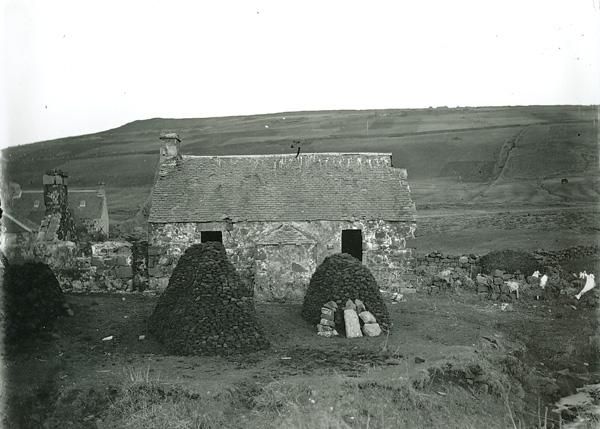
Gesto Cottage, where the MacSwan family lived
Credit: Waternish Estate, Skye and Lochalsh Archive Centre
The next census, taken in 1911, records that Donald had moved to Glasgow. Lodging at no 674 Gallowgate, Glasgow, aged 18, he was employed as a municipal ‘tramway conductor’ who could speak both Gaelic and English.

Donald MacSwan enumerated in the 1911 census
NRS, Crown copyright, 1911 census, 644/2 5/14
In December 1913 Donald enlisted in the Highland Light Infantry. He was posted to the 6th (City of Glasgow) Battalion (Territorial) and, after the outbreak of World War One, served with them in the Dardanelles in north-western Turkey.
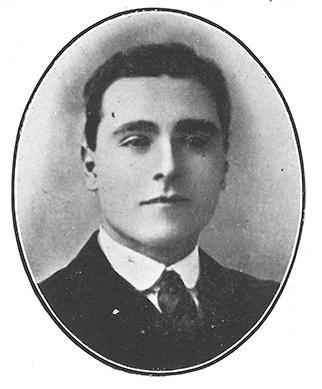
Donald MacSwan
Image shared with kind permission of Kenneth MacLennan
Donald’s brother, John MacSwan, served in the war as a Private in the Lovat Scouts in the Dardanelles and Egypt. John was later transferred to the Cameron Highlanders and served with them in France, where he was wounded.
By the summer of 1915 Donald had written his will, found on page 13 of his Pay Book (Army Book 64).
Donald’s will is one of more than 26,000 ordinary Scottish soldiers wills made available on our website. Most of the men were killed in action, died of wounds or went missing on the Western Front or at Gallipoli, Salonika or in Mesopotamia. Also included are a few men who joined the Royal Flying Corps and the Royal Air Force.
Almost all the wills were written in their pay books by enlisted soldiers and non-commissioned officers who served in the renowned Scottish infantry and cavalry regiments, as well as in many other British regiments, and all the army corps that were on active service.
In addition to the wills from the First World War, there are about 4,750 wills of Scots soldiers serving in all theatres during the Second World War. This includes some women auxiliaries, and several hundred from the South African War and Korean War, and other conflicts between 1857 and 1965.
Donald wrote his will in Gaelic. This is significant as the majority of the surviving wills were written in English; Donald’s choice to use Gaelic was a personal one, perhaps he felt it easier to communicate in Gaelic, or wanted to ensure his family could fully understand his wishes.
Donald was bilingual, speaking both Gaelic and English, however there were people who only spoke Gaelic in Scotland at this time. Between the years 1911 and 1921, the number of Gaelic-only speakers fell by 46% from 18,400 to 9,829. The war was considered a key factor in this decline. By the 1921 census, there were 148,950 people who could speak both languages living in Scotland. Historian Malcolm MacDonald has suggested that 1,797 men from the Western Isles, where the Gaelic-speaking population were especially concentrated, died during World War One out of a population of 46,700. [Source]
Although there were no Gaelic units in the army, some battalions drew recruits from predominantly Gaelic-speaking regions. One example was the 1/8th Argyll and Sutherland Highlanders.
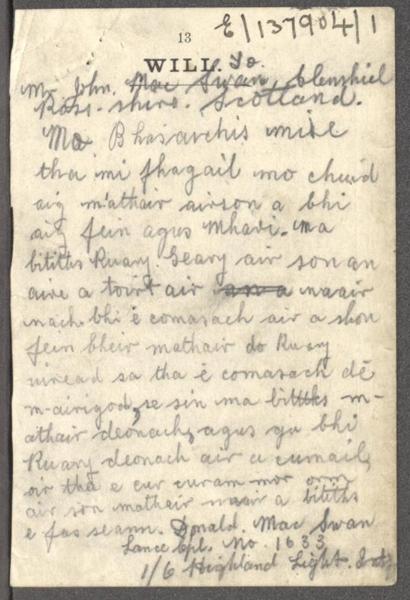
Donald MacSwan’s will
Crown copyright, NRS, SC70/8/117/96
Translated into English, Donald’s instructions were:
“If I die I am leaving my estate to my father to have for himself and Mairi. If Roderick [from] Geary would like to look after my father when he is not able to fend for himself, my father will give as much as he is able to Roderick of my money, as long as my father is willing, and Roderick is willing to keep him, as my father’s welfare in old age is a great concern to me.
Murdo son of Mairi from Geary has £8 belonging to me that I gave to him before he left for Canada, and Donald from Rona has £4/15s[hillings] that I gave to him when he was ill. I hope that they will do their best to give the money to my father if I do not return.”
In the event of his death, Donald was keen to protect and provide for his father. He sought the repayment of money he had loaned to family members where they were able to do so, in a generous way and with concern for others.
In 1912 Murchadh (Murdo) MacLean, Donald’s cousin who he mentions in the will, had emigrated to Canada. Donald had loaned him £8 towards the cost of the voyage. During World War One, Murdo had returned to Europe to fight with the 10th Battalion Canadian Infantry and, following his discharge, spent time in England and subsequently with his mother and family in Geary, Waternish. He returned to Canada in 1920 aboard the SS Casandra, accompanied by his cousin Agnes MacSwan (Donald’s sister). He established a successful life there, where he was Mayor and Postmaster in Morden, Manitoba.
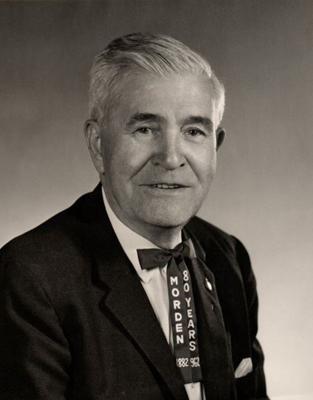
Murdo MacLean
Credit: courtesy of Ruaraidh MacNeil
Roderick, also mentioned in the will, was Donald’s uncle (his father's brother). He had a general merchants shop and fish-curing station in Geary, Waternish. Donald requested that he leave his money to the welfare of his father, hoping that Murdo and Donald from Rona would do their best to return the borrowed money if he was killed in action.
Like so many men, Donald did not return home. Three months later, on 25th November 1915, Donald was killed at Achi Baba, the main position of the Ottoman defences in 1915 during the Gallipoli campaign. He was buried in Pink Farm Cemetery, Helles. His personal inscription is in Gaelic, though it is not known who organised this, or if Donald left instructions elsewhere for the inscription, should he die:
‘IS BEANNAICHTE NA MAIRBH A GHEIBH BAS SAN TIGHEARNA’ (Blessed are those who die in the Lord).
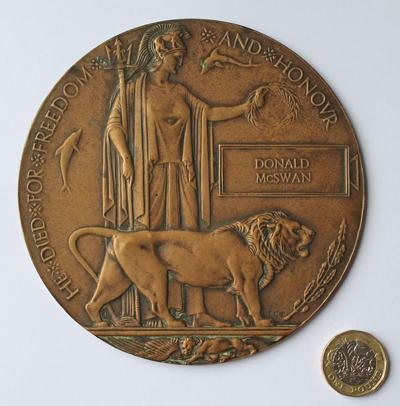
Donald’s memorial plaque which sat on his father’s mantlepiece. The immediate next of kin of all who died serving with the British and Empire forces in the First World War were eligible to receive a plaque. It measures approximately 11cms or 4 ½ inches in diameter.
Shared with kind permission of Kenneth MacLennan
Donald left an estate of £45 2s 8d in the Commercial Bank of Scotland. Today, this is the equivalent of approximately £4,467.00 [Source].
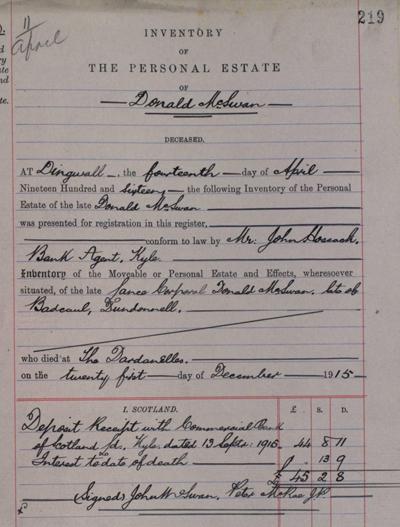
The Inventory of the Personal Estate of Donald MacSwan
Crown copyright, NRS, SC25/44/29 page 223
Unfortunately, Donald’s wish for his father John to be provided and cared for by his Uncle Roderick did not come to pass. Roderick became unwell and John helped to care for him in his last days. Roderick died on 28th December 1918 in Geary, Waternish, from cancer.
In 1920 John MacSwan moved to Badcaul, Dundonnell, as the Free Church missionary. Marion, his wife, had died in 1908, aged 44, shortly before he took up a parish at Knockintorran in North Uist, and later a post in Glen Shiel. John died in 1939.

Donald’s father John MacSwan with daughter Katie MacSwan (Donald’s sister).
Shared with kind permission of Kenneth MacLennan
We remember Donald, along with all those who made the ultimate sacrifice in conflict on this Remembrance Day.
Scotland's People thanks Kenneth MacLennan for his help in producing this article, to Donna Hunt-Kinzett and Donald John Campbell for giving permission to use their research, to Kathleen Whittet who owns the notebook that contains Donald’s poems and Dr Martin MacGregor, The University of Glasgow, for his advice.
For further reading on the MacSwan family and their life in Waternish, see ‘Rena’s Diary – Life in a Scottish Crofting Community’ by Kenneth MacLennan (2nd edition, 2018).